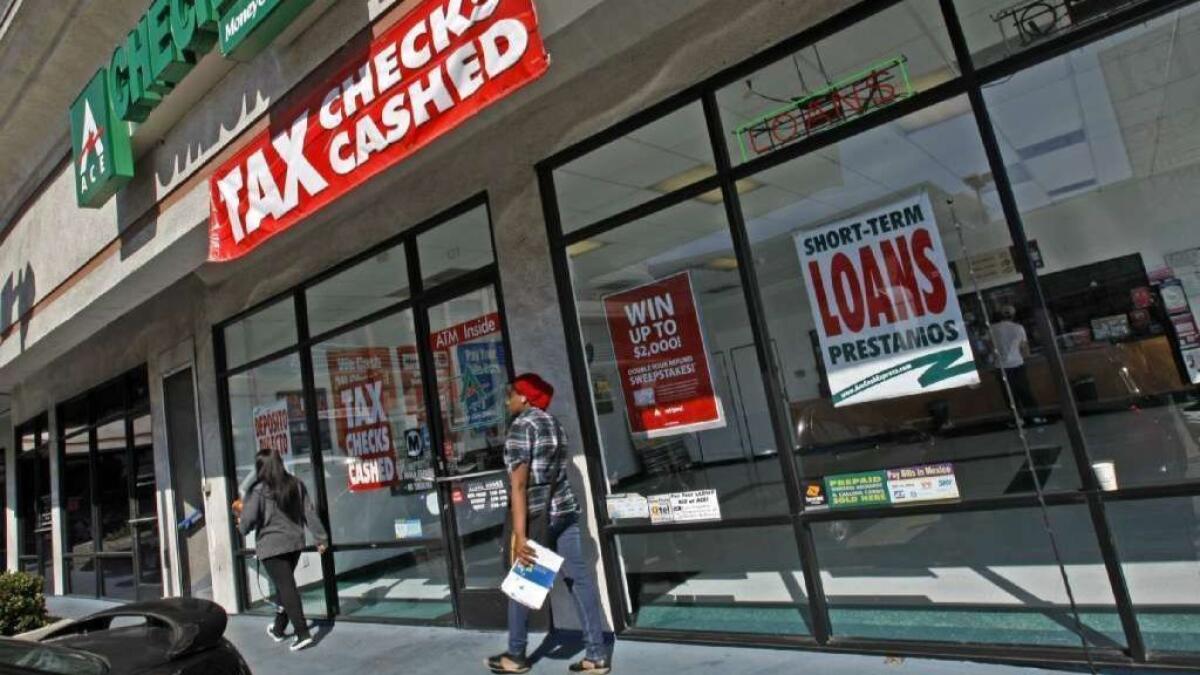California regulator probes links between high-cost lenders and consumer finance sites

The state’s top financial regulator launched an investigation Wednesday of high-cost consumer lenders after the failure of several bills in the Legislature that would have tightened oversight of the industry.
The Department of Business Oversight sent letters to 20 high-interest lenders, asking about their use of so-called lead generators — companies that operate websites connecting consumers to their firms.
The department’s questions include how many customers come through lead generators, how loans to those customers are underwritten and how many of those customers wanted to borrow less than $2,500. Under state law, lenders can charge dramatically higher rates on loans of $2,500 or more than for smaller loans.
Department of Business Oversight Commissioner Jan Lynn Owen said she wants to make sure lenders and lead generators aren’t pushing customers who want to borrow less money into larger, higher-interest loans. Her office has recently alleged that practice by several lenders.
“What we’re seeking is additional information that will help us ensure lenders and lead generators do not use unfair, deceptive practices to trap consumers in high-cost loans they don’t want and can’t afford,” said Owen, who announced the inquiry.
The department targeted companies that last year made at least 1,000 consumer loans of $2,500 to $9,999, and that charged interest rates of 100% or higher on at least 90% of those loans.
The list includes several prominent online-only lenders — Elevate, Enova and related companies CashCall and LoanMe — as well as companies with bricks-and-mortar locations such as TitleMax, Ace Cash Express and MoneyMart.
Together, the 20 companies accounted for more than 60% of all triple-digit APR loans in that size range made in California last year, the department said.
Owen also suggested that the inquiry marks the beginning of a possible crackdown amid inaction by the Legislature.
Lawmakers this year considered but failed to approve several measures, including bills that would have capped interest rates on larger loans, limited the number of payday loans a single borrower could take out at once and required lead generators to be licensed as loan brokers.
Now, Owen said she’s considering using the agency’s existing authority to draft new rules without new legislation. That could include rules requiring lenders to show that they are making loans only to borrowers who have the means to repay and rules governing lead generators.
“Lead generators, especially those who operate online, play a significant and growing role in borrower acquisition,” Owen said. “In California, much of the activity is unlicensed and harmful to consumers. This problem needs to be fixed.”
Owen’s office did not name any particular lead generators as bad actors. Lead generators can be small, independent companies that do little more than operate a website. Leads are often sold to lenders by way of intermediaries called lead aggregators.
Lenders and lead aggregators have balked at the idea of new regulations and fought against bills that would have put new rules or limits on the industry. The trade group Online Lenders Alliance, for instance, had argued that AB 3207, a failed bill that would have required licensing for lead generators, would push many firms out of that business and thereby make it more difficult for consumers to find loans.
“Lead generators provide consumers with access to a broad range of vetted lenders in real time, maximizing the likelihood that consumers will find lenders safely, quickly, and conveniently in the privacy of their homes,” the trade group, which represents lenders and lead generators, wrote in a June letter to the state Senate banking committee. “Lead generators also insulate consumers from the thousands of scams that populate the internet.”
But lead generators can, and too often do, steer customers into bad deals, said Assemblywoman Monique Limón (D-Santa Barbara), the bill’s author.
“These third parties provide advice or recommendations to consumers that may not be in the best interest of the consumer,” she said in a report presented to an Assembly committee.
She said a lead generator may refer a customer to a lender not because that lender offers the best interest rate but rather because it is willing to pay the most for that referral.
The U.S. Consumer Financial Protection Bureau made similar claims in an ongoing lawsuit, filed in 2015, against a Burbank lead aggregator. The bureau sued T3Leads, saying it did little to ensure the lead generators it works with were not making false claims — including claims that customers would be steered toward lenders offering the best rates.
In a statement Wednesday, Online Lenders Alliance Chief Executive Mary Jackson said her members abide by rules that “address practices that could be considered unfair or deceptive.”
“This is a complex issue, which is why lead generators have been actively engaged with the California DBO working towards a pragmatic solution for smart regulation and legislation,” she said.
Limón, who also authored two other unsuccessful bills that would have tightened lending rules, said she’s heartened to see the Department of Business Oversight take a more aggressive stance.
“Our inability as a state legislature to pass meaningful protections for consumers doesn’t keep other branches of the government from expressing their frustration,” she said. “I have to applaud their efforts. They’re doing something.”
She also highlighted a recent California Supreme Court ruling that would allow judges to strike down the interest rates on loans if the rates are found to be “unconscionably” high.
Follow me: @jrkoren
UPDATES:
3:55 p.m.: This article was updated with comments from Assemblywoman Monique Limón.
1:05 p.m.: This article was updated with comments from Mary Jackson, chief executive of the Online Lenders Alliance.
This article was originally published at 12:35 p.m.







